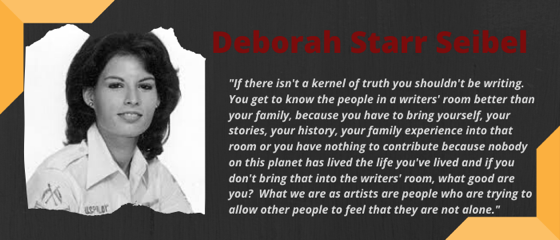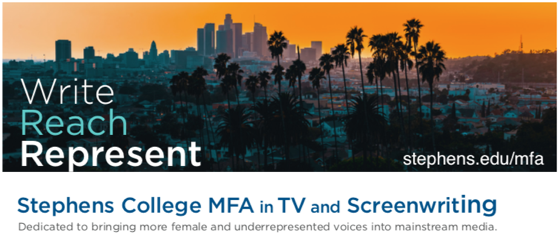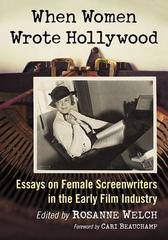![Listen to the latest How I Wrote That Podcast with Tera Hernandez of The Big Bang Theory [Audio]](https://rosannewelch.com/wp-content/uploads/2019/08/hiwt-stephens-logo-1-1.png)

Subscribe to the Podcast with iTunes | TuneIn
Listen to this episode
Podcast: Play in new window | Download
Subscribe:
Deborah Starr Seibel is a multiple award-winning journalist and screenwriter. For the past eight years, she has been an instructor at USC’s School of Cinematic Arts in the John Wells Division of Writing for Film & Television. In addition, she serves as a mentor for Stephens College’s MFA in Screenwriting program. In prime time television, Deborah recently sold two pilots to CBS and is credited with four years on staff. During those years, she wrote six episodes for the final season of NBC’s Sisters and spent three additional years on the staff of Promised Land, the spin-off to CBS’s Touched By An Angel. She has also written episodes for Mysterious Ways and 21 Jump Street.
As a television reporter, Deborah won a George Foster Peabody award for investigative journalism, two Emmy Awards and First Place from the Associated Press for one of her documentaries. As a print journalist, she has written for the New York Times, Los Angeles Times, Chicago Tribune, Parade and USA Today. In addition, she is a long-time national correspondent for TV Guide.
In 2010, Deborah was awarded a USC Annenberg Fellowship to receive her Master’s Degree in Specialized Journalism/The Arts.
“If there isn’t a kernel of truth you shouldn’t be writing. You get to know the people in a writers’ room better than your family, because you have to bring yourself, your stories, your history, your family experience into that room or you have nothing to contribute because nobody on this planet has lived the life you’ve lived and if you don’t bring that into the writers’ room, what good are you? What we are as artists are people who are trying to allow other people to feel that they are not alone.”” Deborah Starr Seibel
Presented by Stephens College MFA in TV and Screenwriting
Visit the Stephens College MFA in TV and Screenwriting for more information.
Follow @StephensMFA on Instagram
Follow and Like the Stephens College MFA in TV and Screenwriting

![Learn More About the Stephens College MFA in TV and Screenwriting with this Open House Session [Video]](https://rosannewelch.com/wp-content/uploads/2020/05/mfa-open-house.jpg)


![11 More On Shirley Jackson from When Women Write Horror with Dr. Rosanne Welch [Video] (1 minute 3 seconds)](https://rosannewelch.com/wp-content/uploads/2020/05/rmw-cpp-horror-11.jpeg)
![10 Shirley Jackson from When Women Write Horror with Dr. Rosanne Welch [Video] (36 seconds)](https://rosannewelch.com/wp-content/uploads/2020/05/rmw-cpp-horror-10.jpeg)
![09 More Edith Wharton’s Ghost Stories from When Women Write Horror with Dr. Rosanne Welch [Video] (32 seconds)](https://rosannewelch.com/wp-content/uploads/2020/04/rmw-cpp-horror-09.jpeg)
![08 Edith Wharton’s Ghost Stories from When Women Write Horror with Dr. Rosanne Welch [Video] (1 minute 3 seconds)](https://rosannewelch.com/wp-content/uploads/2020/04/rmw-cpp-horror-08.jpeg)
![07 African-American Writers In History from When Women Write Horror with Dr. Rosanne Welch [Video] (53 seconds)](https://rosannewelch.com/wp-content/uploads/2020/04/rmw-cpp-horror-07.jpeg)
![06 LGBTQ Writers In History from When Women Write Horror with Dr. Rosanne Welch [Video] (1 minute 8 seconds)](https://rosannewelch.com/wp-content/uploads/2020/04/rmw-cpp-horror-06.jpeg)
![05 Amelia Edwards from When Women Write Horror with Dr. Rosanne Welch [Video] (1 minute 7 seconds)](https://rosannewelch.com/wp-content/uploads/2020/04/rmw-cpp-horror-05.jpeg)


